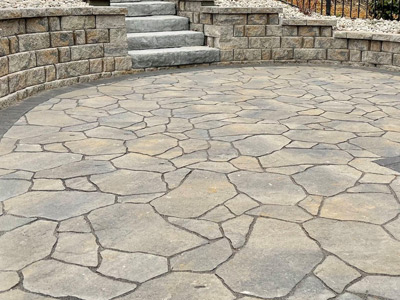Comparing Pavers Materials: Concrete Vs. Brick Vs. Natural Stone
 When starting on a landscaping project, whether a new patio, walkway, or driveway, one of the most crucial decisions you'll face is choosing the suitable paver material. The choice of pavers impacts the aesthetic appeal of your outdoor space and influences durability, maintenance requirements, and overall project cost.
When starting on a landscaping project, whether a new patio, walkway, or driveway, one of the most crucial decisions you'll face is choosing the suitable paver material. The choice of pavers impacts the aesthetic appeal of your outdoor space and influences durability, maintenance requirements, and overall project cost.
Three of the most popular paver materials in landscaping are concrete, brick, and natural stone. Each material has its own unique set of characteristics, advantages, and potential drawbacks. If you're aiming for a sleek, modern look or a more rustic, timeless appeal, understanding the nuances of these paver options will be invaluable in creating the outdoor space of your dreams.
The Types of Paver Materials
At Preferred Outdoor Designs, LLC, we provide custom paver installations. Here are a few of the most popular and durable paver materials you can choose from for your hardscaping project:1. Concrete Pavers
- Composition and Manufacturing - Concrete pavers use a mixture of cement, aggregate, and water, often with added pigments for color. They are manufactured in molds under high pressure and vibration, producing a dense, uniform product.
- Advantages and Disadvantages - One of the main advantages of concrete pavers is their affordability compared to brick or natural stone. They offer consistent sizing and shape, making them relatively easy to install and replace, and are quite durable when maintained well.
- Maintenance Requirements - Regular maintenance is necessary to keep concrete pavers looking their best. This includes periodic sealing to maintain color and protect against stains and cleaning and re-sanding joints.
- Types and Characteristics - Natural stone pavers come in various types, including granite, limestone, sandstone, slate, and travertine. Each type of stone offers unique color, texture, and durability characteristics.
- Advantages and Disadvantages - The primary advantage of natural stone pavers is their unparalleled beauty and uniqueness. No two stones are exactly alike, creating a truly one-of-a-kind installation. Many stone pavers, especially harder varieties like granite, offer exceptional durability that can last a lifetime or longer. Natural stone also tends to increase property value more than other paver options.
- Maintenance Requirements - The maintenance needs for natural stone pavers vary depending on the type of stone chosen. Some softer stones may require regular sealing to protect against stains and weathering, while harder stones like granite need minimal upkeep.
Making The Right Paver Choice
Several factors come into play when choosing between concrete, brick, and natural stone pavers. Durability and longevity vary, with natural stone and brick generally outlasting concrete. Cost considerations are significant, with concrete typically being the most affordable and natural stone the most expensive.Installation complexity is another critical factor, with concrete being the easiest to install and natural stone often requiring professional expertise. Environmental impact, weather resistance, slip resistance, and heat absorption also vary among the materials.
Equally crucial to the material selection is the installation process. Professional installation can significantly improve your paved surfaces' longevity, appearance, and performance. Experienced contractors bring knowledge about proper base preparation, drainage considerations, and precise laying techniques that can prevent common issues like settling, cracking, or uneven surfaces. Their expertise ensures that your chosen pavers are installed to withstand the test of time and the elements, maximizing your investment. An established company will also cover their work with warranties.
We provide superior paver installations and handle residential and commercial projects of all shapes and sizes. For more details, contact Preferred Outdoor Designs, LLC, via this Online Form or call us at 502-245-3997, and our knowledgeable staff will respond immediately.
